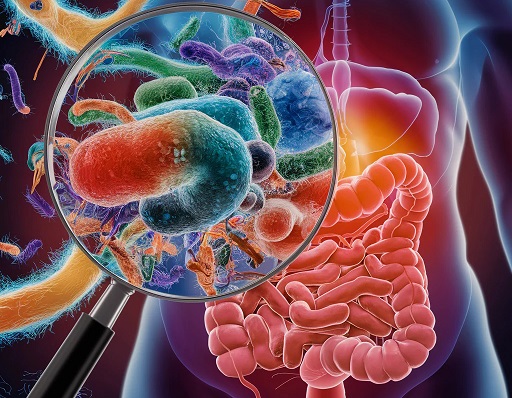Nikhil Prasad Fact checked by:Thailand Medical News Team Nov 05, 2025 3 months, 1 week, 2 days, 2 hours, 14 minutes ago
Medical News: from the University of Brasília reveal how the gut microbiome may play a key role in lingering post COVID symptoms
A new study from the Universidade de Brasília (UnB), Brazil, has shed light on how SARS-CoV-2 infection causes long term disruption to the body’s gut microbiota, potentially leading to chronic gastrointestinal problems and other post COVID complications. The research highlights how COVID-19 disturbs the natural balance of beneficial bacteria in the digestive system, increasing harmful microbes and causing inflammation that persists long after the infection has passed. These imbalances can trigger a range of symptoms commonly seen in Long COVID, from digestive distress to mental health changes. This
Medical News report explores how the gut, lungs, and brain interact after COVID-19 and how future treatments might restore microbial balance and improve recovery.
 COVID-19 Causes Serious Disruptions to Gut Health with Long Lasting Effects
The Connection Between the Gut and COVID-19
COVID-19 Causes Serious Disruptions to Gut Health with Long Lasting Effects
The Connection Between the Gut and COVID-19
The gut microbiome—the community of bacteria and microorganisms living inside the digestive system—plays a vital role in regulating immune responses. During SARS-CoV-2 infection, this delicate system is thrown off balance. Beneficial microbes such as Bifidobacterium and Faecalibacterium decline, while opportunistic pathogens like Pseudomonas, Enterococcus, and Acinetobacter flourish. This change promotes inflammation and weakens the intestinal barrier, allowing toxins to leak into the bloodstream and fuel an overactive immune response. The study found that such dysbiosis not only worsens infection severity but also persists for months, linking directly to post COVID gastrointestinal and fatigue symptoms.
The Gut–Lung and Gut–Brain Connection
Researchers also observed that disturbances in gut bacteria can affect both respiratory and neurological systems through what they describe as the gut–lung and gut–brain axes. The virus uses the ACE2 receptor, found in both the lungs and intestines, to invade human cells. When the infection reduces ACE2 activity, it causes malabsorption and inflammation in the intestines, worsening the gut imbalance. Meanwhile, toxins and bacterial metabolites travel through the bloodstream, triggering lung inflammation and even influencing the brain. Many Long COVID patients report depression, anxiety, or “brain fog,” which may be caused by reduced production of neurotransmitters like serotonin due to damaged gut bacteria.
Key Changes in Gut Bacteria After Infection
According to the study, patients who recovered from severe COVID-19 continued to show high levels of harmful bacteria such as Clostridium hathewayi and Morganella morganii, and reduced amounts of helpful species like Roseburia and Collinsella. These beneficial microbes are essential for producing short-chain fatty acids that maintain intestinal integrity and suppress inflammation. Lower levels of these compounds can contribute to ongoing immune dysfunction and poor
recovery. Interestingly, some bacteria like Blautia and Prevotella increased after recovery, suggesting the body’s attempt to restore balance—though the exact effects remain under investigation.
Potential Treatments and Future Hope
The UnB team reviewed several treatment options aimed at restoring gut balance in post COVID patients. Prebiotics, which promote the growth of healthy bacteria, and probiotics, which add beneficial microbes directly, were both found to help reduce inflammation and improve digestive symptoms. Some studies even suggest probiotic combinations can lower fever and nausea duration in COVID-19 cases. Fecal microbiota transplantation (FMT), in which stool from healthy donors is used to repopulate a patient’s gut, also showed promise. In small trials, it restored beneficial bacteria like Bifidobacterium and Faecalibacterium and reduced inflammation, although safety standards must be strengthened before wider use.
The Bigger Picture
The findings emphasize that COVID-19 is not just a respiratory disease—it affects the entire body, particularly the gut. Restoring gut health could be key to treating persistent Long COVID symptoms. The researchers stress that more human studies are needed to understand how gut bacteria changes over time and to develop targeted probiotic or microbiome-based therapies. Maintaining a healthy microbiota through balanced diet, stress management, and possibly medical microbiome therapy could help reduce the long-term impact of the virus on overall well-being.
The study findings were published in the peer reviewed journal: Microorganisms.
https://www.mdpi.com/2076-2607/13/11/2529
For the latest COVID-19 news, keep on logging to Thailand
Medical News.
Read Also:
https://www.thailandmedical.news/articles/coronavirus
https://www.thailandmedical.news/articles/long-covid
